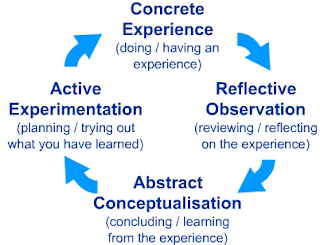Introduction
As soon as I was 16 years old I began competing for the title of Miss Dance of
I can relate the experiences I had participating in this competition to the four parts of Kolb’s Cycle.
Concrete Experience
Getting up on the stage and actually performing the routine in front of an audience was the most incredible feeling in the world – and one that I learnt the most from. To experience the moment – living, feeling and breathing the dance; expressing my whole body and soul through the performance – was such an amazing experience, and one that opened my mind and increased my confidence.
Before the performance I would experience the preparation side of things:
- Doing my make up and styling my hair
- Warming my muscles
- Psyching myself up to go stage
- Focusing my mind on the performance from a technical and creative perspective.
Once the adrenalin was pumping through my veins I would experience another level of consciousness - a level that I would never feel in rehearsals. When the adrenalin was flowing through me, I could feel a real energy in my work and my body would work almost beyond its limits. Using this adrenalin, I would usually do my best performances – the ones with the X Factor.
Reflective Observation
Through performing my routine at various Heats, I was able to learn from each and every performance. My dance teacher and my mum would help me to reflect on my performance and assess the strengths and weaknesses of it on that particular occasion. My dance teacher would coach me on how to improve the quality of my dance technique, and we would focus on ways of enhancing my performance skills.
In addition to the dance technique, you were also marked on your overall performance, which included your appearance. Make up, hair design and costume were all important factors, therefore they needed to be assessed too. We would discuss how the costume complimented my physique and the content of the dance, and whether the make up and hair was staying immaculate throughout the performance and if it was in-keeping with the theme of the routine.
On a personal level, I would always reflect on how nervous I was during the performance. On the whole, it seemed that the worse my nerves were, the less control I had over the performance and therefore the weaker the routine was. My dance teacher would reflect on where I was carrying the tension and nerves in my body and how it was effecting my dancing.
It was crucial we monitored all of these aspects, in order for me to move forward. It was imperative that I continue to improve my routine for the next Heat, and the next Heat, until eventually I won a Heat and gained my place at the Finals.
Abstract Conceptualisation
Reflecting on my own performance was not enough – I had to win and so I decided to study what makes someone a winner.
At the Heats, once I had performed my routine, I would sneak into the audience and watch all the remaining competitors. I would observe and monitor what made their routine stand out from the rest; whose make up looked most effective under the stage lights and why; what components made up the most dynamic routine – was it the girl with the most raw energy or the girl with the most strength, control and stamina who could execute every last detail of every move to the maximum potential.
Throughout the dances I would make notes on the performers who stood out to me and decided theoretically who my winner would be. Then I would compare it to the adjudicator’s winner and listen to all of her comments.
What was the judge looking for – originality, flexibility, personality, technique, use of theme and ‘Star Quality’.
I was eager to find out what gives you ‘Star Quality’. I would read books on how celebrities became stars and how athletes became the best in their field – what created the mentality of a winner?... positive thinking and determination, as well as the drive to be the best! I became even more motivated to continually work and work until I was physically and mentally at my peak; until I was at the stage where I truly believed I deserved to win because I was the best in that competition; I was the best in
Active Experimentation
A strong and inspiring dance performance does not solely depend upon the performance of the dancer – it is also to do with the content of the choreography, the costume design, the choice of music, etc. In order to know what would and wouldn’t improve the overall success of the routine, my dance teacher and I would need to experiment with different ideas. Some of these ideas would only be trialled in rehearsals and training, others would be trialled on stage.
In addition to experimenting with the content of the performance, I would also experiment with techniques on how to control my nerves. I was aware that my nerves would prevent me from having full control over my performance as they would create tension in my shoulders; tighten my leg muscles so my kicks weren’t as high as they could be; and hinder my breathing making me struggle to execute the whole routine with maximum strength and stamina.
In order to control my nerves, and to monitor which techniques were the most successful, I would use a different technique before each performance. I experimented with breathing exercises; meditation; focusing entirely on the performance and nothing else in the room; focusing on anything except the performance in order to take my mind off it; warm-up rituals and mantras. To know whether a technique worked for me, as an individual, I needed to experiment with it.


No comments:
Post a Comment